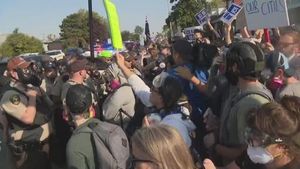Israeli authorities have announced a series of recent arrests and detentions linked to Iran and the ongoing conflict over Gaza, highlighting the complex and growing web of espionage and activism that continues to challenge the region’s security and political landscape. From the arrest of a young Israeli citizen accused of spying for Iran to the high-profile detention of an Iranian-Finnish activist aboard a Gaza-bound aid flotilla, the events of early October 2025 have drawn international attention and raised urgent questions about the evolving dynamics between Israel, Iran, and the wider world.
On October 4, 2025, Israeli police and the country’s internal security agency, Shin Bet, revealed the arrest of a 23-year-old Israeli citizen employed at a hotel near the Dead Sea. According to The Times of Israel, the young man is suspected of photographing the hotel’s premises and surrounding areas to transmit sensitive information to Iranian operatives. While the authorities have yet to disclose the specifics of his recruitment or the precise methods he used to communicate with his alleged handlers, officials have stated that the investigation is ongoing and that further details will be released as the case develops.
This incident is not an isolated one. As reported by Yedioth Ahronoth and Haaretz, it forms part of a broader pattern of suspected Iranian espionage inside Israel, with dozens of similar cases exposed over the past two years. Israeli security officials describe the trend as an “alarming expansion of Tehran’s espionage activities,” pointing to a sophisticated network of online recruitment and small but effective financial incentives to lure Israeli citizens into cooperating with Iranian intelligence.
Earlier in the same week, Israeli police announced the arrest of two residents of Holon, a city near Tel Aviv, on suspicion of photographing military sites and sending the images to Iranian agents. These recent arrests bring the total number of Israeli citizens detained on charges of cooperating with Iran to more than 20 since the beginning of 2025 alone. The tasks assigned to these individuals have ranged from photographing the homes of officials and military bases to gathering information on defense systems. Payments for such activities have reportedly been modest—sometimes as little as a few hundred dollars, occasionally transferred via cryptocurrency.
According to Israeli security sources, Iran’s strategy often involves the use of fake social media profiles. Posing as employers or intermediaries, Iranian operatives build trust with their targets, eventually recruiting them for intelligence-gathering missions. This method, officials warn, exploits social and economic vulnerabilities within Israeli society. The media has described this trend as a serious challenge to Israel’s internal security, with the potential to erode public trust and heighten anxiety about the country’s resilience in the face of foreign threats.
While the Israeli government has long been vigilant about the threat of Iranian espionage, the current wave of arrests underscores the persistence and adaptability of Tehran’s intelligence apparatus. “The scope and frequency of these incidents are deeply concerning,” said one Israeli security official, as quoted in Haaretz. “We are seeing a shift in tactics, with more emphasis on online recruitment and the exploitation of everyday citizens.”
Meanwhile, the Israeli-Palestinian conflict has taken on new dimensions at sea. In early October 2025, an Iranian activist named Renaz Ebrahimi, aged 34 and holding Finnish citizenship, was detained by Israeli forces while aboard the Global Sumud Flotilla, a humanitarian convoy attempting to break the Israeli blockade of Gaza. The flotilla, which launched in July 2025, began with 44 vessels and included participants from a diverse array of countries, including Spain, Italy, Turkey, and Malaysia. Every vessel, including the Polish-flagged Marinette carrying Ebrahimi and six crew members, was ultimately intercepted by Israeli naval forces—this particular boat was stopped 49 miles from Gaza’s coastline.
Ebrahimi, who identifies herself as a journalist and activist, chronicled her journey on social media, posting videos in Finnish and English. In one Instagram video, she narrated the moment of her detention by Israeli forces, strongly condemning the military’s incursion into Gaza and describing it as genocide—a charge that Israel categorically denies. Israeli authorities, for their part, have accused the activists aboard the flotilla of engaging in propaganda on behalf of Hamas, the militant group that controls Gaza.
“We stand with every human rights defender aboard. Their courage is part of our shared struggle to end Israel’s deadly siege,” the Freedom Flotilla Coalition declared in a statement following the interception. The coalition, which has organized similar missions since 2008, vowed to continue its efforts to challenge Israel’s blockade of the coastal enclave. Among those detained alongside Ebrahimi was Swedish climate activist Greta Thunberg, whose presence brought additional international scrutiny to the incident.
Israel imposed its land, air, and sea blockade on Gaza in 2007, after Hamas seized control of the territory. The Israeli government maintains that the blockade is necessary to prevent weapons smuggling and restrict Hamas’s military capabilities. Critics, however, argue that the blockade has caused severe humanitarian suffering and stoked tensions both within Gaza and across the region.
The flotilla’s interception is the latest in a series of confrontations at sea, with activists, journalists, and international observers repeatedly challenging Israel’s policy and drawing attention to the plight of Gaza’s civilian population. Each attempt to breach the blockade—whether successful or not—serves as a flashpoint for debate over the legal, ethical, and strategic dimensions of Israel’s security measures.
The twin stories of espionage and activism unfolding this October reveal a region grappling with both internal and external pressures. On one hand, Israel faces the persistent threat of Iranian intelligence operations, which have become increasingly sophisticated in their recruitment tactics and difficult to detect. On the other, it must contend with international criticism and direct action campaigns targeting its policies in Gaza, with activists risking detention or deportation to make their voices heard.
These developments have not gone unnoticed by Israeli society, where concerns over security, civil liberties, and the country’s international standing continue to spark heated debate. Some observers see the recent arrests as evidence of the need for greater vigilance and more robust counterintelligence efforts. Others worry that the focus on security could come at the expense of democratic norms and civil rights, especially as more citizens find themselves caught up in investigations or accused of collaboration under ambiguous circumstances.
For now, both the Israeli authorities and their critics appear determined to continue their respective campaigns—one to root out espionage and safeguard national security, the other to challenge the blockade and advocate for humanitarian relief in Gaza. With tensions running high and the stakes only increasing, the coming months are likely to bring further developments, as each side tests the limits of its resolve and resources.
As Israel navigates these dual challenges—external threats from hostile states and internal dissent from activists and ordinary citizens alike—the outcome will shape not only its security posture but also its relationship with the rest of the world. The events of October 2025 serve as a stark reminder that, in the Middle East, the lines between espionage, activism, and geopolitics are rarely clear-cut, and the consequences of each new incident can reverberate far beyond the headlines.




